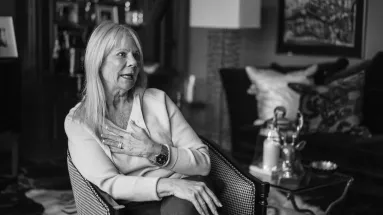Facing Uncertainty at Different Stages of Your Journey
Facing Uncertainty at Different Stages of Your Journey

When you’re living with cancer, uncertainty may take many forms. You may have questions about “what happens next”. Or you might feel complex emotions and uncertainty. Feeling uncertain can lead to feelings of stress.
So how do you plan for something that is, by definition, uncertain? There’s of course no way to predict exactly how your unique cancer journey will unfold. But there are steps you can consider taking along the way that may help you feel stronger and more resilient.
Here, we share some Microsteps – small, easy actions to help boost well-being — that may help you cope with uncertainty after a diagnosis of cancer. These steps may help you tackle that uncertainty, all the way from diagnosis through to life after cancer. As always, consult with your care team for the management practices that are best for you.
Microsteps that may be taken after diagnosis
A cancer diagnosis may lead to a world of questions — with no easy answers. You may feel overwhelmed by the amount of new information, and that’s OK. Useful ways to cope with uncertainty may include learning more about your cancer and beginning to build your support network.
Writing down a list of questions about your diagnosis.
Having the facts can reduce fear. Consider writing down any questions you have about your cancer, and you can share these with the care team at your next appointment. Remember that no question is a bad question!
Asking yourself, “How do I learn best?”
Learning about your cancer may help you feel more in control and less uncertain. So ask yourself: Do you learn through reading? Or do you learn through pictures or video? Are you someone who likes to talk things through in groups? Or do you like to think things through when you’re alone? Do you prefer facts and studies, or find comfort in the stories and experiences of others? Taking some time to think about your own strengths and preferences as a learner may help you find information in the best format for you.
Asking your care team for personalized resources.
Based on how you like to learn, consider asking for help in formats that fit your preferences. For example, your care team can recommend books, videos, trusted cancer advocacy organizations, or support groups.
Thinking about a challenge you faced in the past.
Coming to terms with your diagnosis may be one of the hardest things you’ve ever had to do. But it’s not the only challenge you’ve faced in your life. This thought exercise may help you remind yourself that you’ve been through hard things before. In turn, this may help you feel more resilient when facing new challenges.
Building your support network.
At this early stage in your journey, being with people you love and trust may be one of the most important steps you can take. Here are some questions you could ask yourself:
- Who do I feel comfortable sharing my diagnosis with?
- Who has been reliable and supportive in the past?
- Who can offer support with day-to-day things?
- Who can offer emotional support?
- Who has experience with cancer or illness that might be relevant and helpful?
Microsteps to consider before starting cancer treatment
Writing down a list of questions about your treatment plan.
It may help to write down any questions you have about your treatment plan. You can then share these questions with your care team at your next appointment. This may help you to feel more in control of your own health.
Speaking up for your mental health.
Fear, anxiety, and depression are common mental health challenges experienced by people living with cancer, and uncertainty can often exacerbate these challenges. But during treatment, mental health needs don't always receive the same attention as physical symptoms and side effects.
If you’ve struggled with your mental health in the past, it could be a good idea to let your care team know. And here are some questions to consider asking your care team, whether or not you have a history of mental health challenges:
- How does mental health support fit into my treatment plan?
- How do you recommend I care for my mental health during treatment?
- Are there any warning signs of worsening mental health that I should watch for?
- Are there specific therapies or techniques that can help with my mental health?
- What should I do if I feel overwhelmed or worried about my future?
Creating your cancer treatment journal.
Keeping a health journal to track symptoms, emotions, and questions may help you stay organized. It can help you prepare for medical appointments.
Setting realistic goals.
If you enjoy setting and reaching goals, this may help you feel more in control as you get ready to begin treatment. Giving yourself goals to focus on and look ahead to may also help you manage uncertainty. Examples of goals might include:
- Checking in each day with someone you care about
- Taking time each day to focus on your mental health
- Taking a daily walk (or another form of movement)
- Setting an evening alarm to remind yourself to get to bed on time and get the sleep you need
Continuing to learn.
If learning about your cancer helps you feel more informed and less uncertain, consider setting goals to keep learning. Examples include:
- Making a reading list of books, articles and websites
- Try looking for information from trustworthy sources, such as health organizations, charities, and universities
- Taking part in online communities where people living with cancer share experiences, information and advice
- If being part of a community begins to bring you down, then don’t feel like you have to stay in it
- Subscribing to a cancer journal or newsletter
Microsteps for transitioning from active treatment to survivorship
Some people who have finished cancer treatment experience a mix of emotions, including gratitude and uncertainty. That's because life after cancer can bring its own unique challenges, from survivor guilt to worries about cancer returning.
Joining a survivorship program or community to stay connected.
After finishing treatment, some people find meaning in staying connected with other people that have had cancer. Support groups and survivorship programs can provide ongoing support and information.
Committing to regular follow-ups with your care team or therapist.
Staying in touch with your care team as you live life without cancer may help you manage any uncertainty and fears of the cancer coming back. Making sure you go to follow-up appointments with your care team can help to reassure you about your health and allow for any potential issues to be found early.
Volunteering or becoming a mentor.
Your unique perspective and experience of cancer can be a source of strength for others that have been diagnosed with cancer. Volunteering has a range of benefits, from reducing stress to giving you a fresh sense of purpose. Some ideas include:
- Taking part in cancer fundraising events, like charity walks or runs
- Sharing your journey through public speaking, writing, or social media
- Taking part in hospital programs that connect survivors with those currently in treatment
Think back to a challenge you faced early in your cancer journey.
If you’re struggling with uncertainty, try remembering a time in the past that you overcame a challenge. This may help you put your current struggles in perspective and remind you that you’ve been through hard times and faced big questions before.
Developed with Thrive Global













